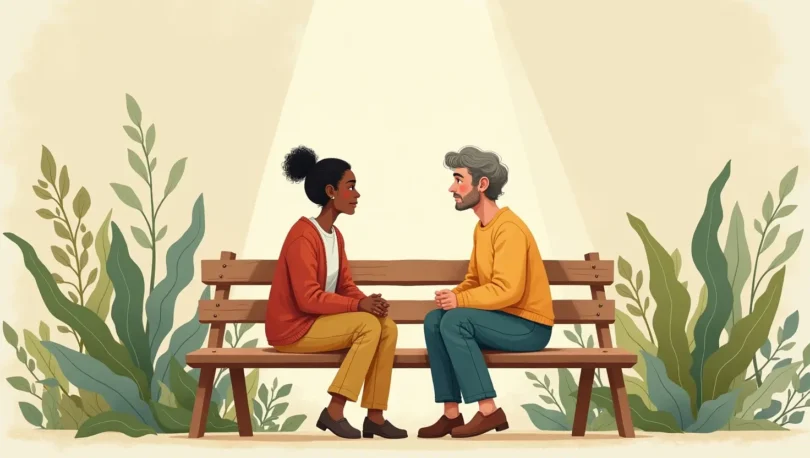In every relationship, whether it’s with a partner, family member, or friend, communication is the lifeblood that keeps the connection alive. But what if we told you that true Empathetic communication goes beyond just talking and listening? It’s about understanding, feeling, and responding with genuine empathy. Empathetic communication is not just a skill—it’s a way of deepening your emotional connection, fostering trust, and creating a bond that stands the test of time.
When we communicate with empathy, we step out of our own world and into our partner’s, not to fix things but to understand their emotions and experiences fully. It’s about saying, “I see you, I hear you, and I’m here with you.” Whether you’re navigating a tough conversation or sharing a joyful moment, empathetic communication opens the door to deeper intimacy, stronger trust, and a more resilient relationship. In this post, we’ll explore why empathetic communication is essential for couples and how you can implement it in your relationship to foster connection and growth.
Table of contents
Why Empathetic Communication Is the Heartbeat of a Healthy Relationship
- Understanding Emotional Intelligence in Love
- How Active Listening Builds Trust and Intimacy
- The Role of Vulnerability in Emotional Connection
10 Deep Intimate Truths About Empathetic Communication Every Couple Needs
Strengthening Your Relationship Through Intentional Empathy
- Practice the Love Languages With Empathy in Mind
- Seek Help When Needed Couples Therapy Isn’t a Weakness
- Building Empathy Through Shared Experiences
Why Empathetic Communication Is the Heartbeat of a Healthy Relationship
At the core of every thriving relationship lies a powerful force that keeps everything in sync—communication. But not just any communication. We’re talking about empathetic communication, the kind that goes beyond words and touches the heart. It’s the key that unlocks deeper emotional connections, builds trust, and fosters mutual understanding.
When we communicate with empathy, we’re not just talking—we’re truly listening and feeling. We step into our partner’s world, acknowledge their feelings, and respond with care. Empathetic communication nurtures a bond that can withstand challenges, creates space for vulnerability, and helps couples navigate through both good and tough times. In this section, we’ll explore why empathetic communication isn’t just important, but essential for keeping the heart of your relationship healthy and strong.
Understanding Emotional Intelligence in Love
When it comes to building a relationship that lasts, emotional intelligence isn’t just a buzzword—it’s the foundation. Coined and explored deeply by Daniel Goleman, emotional intelligence refers to the ability to recognize, understand, and manage our own emotions while also being aware of and sensitive to the emotions of others. And in love, this ability becomes nothing short of essential.
At its core, emotional intelligence helps you tune into your partner’s emotional state without them needing to spell it out. It’s the subtle art of noticing when something feels off, even when no words are spoken. It’s the warm pause before reacting. It’s the quiet presence during a storm. These small, emotionally aware moments create what psychologists call emotional connection—that invisible thread that ties two hearts together with empathy and understanding.
Understanding your partner goes far beyond knowing their favorite color or their go-to coffee order. True understanding is emotional. It’s when you begin to sense their needs, their fears, their joys, and their vulnerabilities. It’s when their silence speaks as loudly as their words, and you’re emotionally attuned enough to listen.
Emotionally intelligent couples know how to navigate disagreements without tearing each other down. They practice emotional regulation, which means they manage their reactions rather than letting emotions explode. They also practice emotional validation, acknowledging their partner’s feelings instead of dismissing or minimizing them.
In short, emotional intelligence in love isn’t about being perfect—it’s about being present. It’s about consistently choosing connection over control, curiosity over assumptions, and understanding over judgment.
So, if you want to strengthen your emotional connection, start by building your emotional intelligence. As Goleman himself said, “In a very real sense we have two minds, one that thinks and one that feels.” The secret to lasting love lies in learning how to speak both.
How Active Listening Builds Trust and Intimacy
In relationships, one of the most powerful gifts you can offer your partner isn’t advice, a solution, or even praise—it’s your full, undivided attention. That’s the essence of active listening.
Unlike passive listening—where you hear words but don’t truly absorb their meaning—active listening in couples is a deliberate, mindful practice. It’s about being present in the conversation, not waiting for your turn to speak or silently judging what’s being said. Instead, you listen with empathy, with curiosity, and with the intention of understanding your partner’s experience, not just their words.
Dr. John Gottman, a renowned relationship psychologist and founder of The Gottman Institute, emphasizes that couples who actively listen to one another are far more likely to build long-lasting bonds. His research shows that emotional attunement—the ability to truly listen and respond with empathy—creates a safe space where partners feel heard, valued, and emotionally secure.
When you practice active listening, you communicate:
“I’m here. I care. I want to understand you.”
This alone can be transformational. It fosters emotional safety, the key ingredient in any deep relationship. When your partner feels safe opening up to you, trust naturally follows. And where trust grows, so does intimacy.
But active listening is more than nodding and saying “uh-huh.” It involves:
- Maintaining eye contact to show you’re present
- Reflecting back what you’ve heard, like “So you’re feeling frustrated because you felt ignored at dinner?”
- Asking thoughtful follow-up questions rather than jumping to advice
- Putting away distractions—yes, that includes your phone
It also means listening without immediately defending yourself or trying to “fix” your partner’s emotions. Sometimes your partner doesn’t need a solution—they need a connection.
Mindful communication, as Gottman suggests, is a relationship skill that’s learned over time. The more you practice it, the more emotionally available you become. And that availability—the ability to be present in tough moments, to really get your partner—is what turns everyday communication into a deeply intimate act.
So, if you want to build a relationship that’s not only strong but sacred, start with your ears. The deepest love often begins with the quietest moment of understanding.
The Role of Vulnerability in Emotional Connection
Vulnerability—just the word can make some people squirm. But in the context of love, it’s not a weakness. It’s actually one of the deepest forms of strength. According to researcher and storyteller Brené Brown, vulnerability is the birthplace of love, belonging, and connection. And when it comes to relationships, it’s what separates surface-level conversations from soul-level bonds.
To be vulnerable means to express your feelings honestly, without armor or pretense. It’s telling your partner, “I’m scared of losing you” or “I felt hurt when you didn’t check in.” It’s opening up, even when your voice shakes, because the relationship matters more than the fear of judgment. That kind of truth-telling invites your partner into your inner world—and that’s where real connection begins.
But here’s the thing: vulnerability requires safety. You won’t open up if you think you’ll be mocked, dismissed, or ignored. That’s why emotional validation is so critical. When your partner shares something raw, your job isn’t to fix it or minimize it. Your job is to hold space. To say, “I hear you. That makes sense. I’m here.” Those words create emotional shelter—an unspoken permission to keep being real.
Brené Brown often says, “Vulnerability is not winning or losing; it’s having the courage to show up when you can’t control the outcome.” And in love, there are no guarantees. But when both partners choose to show up vulnerably, the result is an emotional connection that’s honest, resilient, and profoundly human.
Think of vulnerability as the bridge that spans emotional distance. Without it, couples drift. With it, they grow closer—even in the hard moments. That’s because when you express your feelings, you invite empathy. And empathy—the heart of empathetic communication—brings people together like nothing else.
So if you’re wondering how to build more emotional intimacy, start by being real. Take the risk. Say the thing. Let your heart speak. Because vulnerability, when met with kindness and validation, doesn’t just connect you—it heals you.
10 Deep Intimate Truths About Empathetic Communication Every Couple Needs
Empathetic communication isn’t just a skill—it’s a love language. It’s the way couples grow stronger through honesty, connection, and emotional safety. At the heart of every deep, lasting relationship is the ability to hear—not just the words—but the heart behind the words. Below are ten deep, intimate truths every couple needs to understand and live by if they want to build a relationship that not only survives—but thrives.
1. Empathy Isn’t Just Hearing—It’s Feeling With Your Partner
It’s not enough to listen—you have to feel. Empathetic communication means stepping into your partner’s emotional shoes. It’s not about offering solutions; it’s about showing up with compassion and saying, “I’m with you in this.”
2. Words Matter—But Tone and Timing Matter More
You could say the right thing the wrong way, and it still hurts. Your tone of voice, facial expressions, and the timing of your response can either build a bridge or burn one. Empathy means being mindful of how and when you speak, not just what you say.
3. Emotional Safety Fuels Open Conversations
Trust doesn’t grow in chaos—it grows in calm. When your partner knows they won’t be judged, mocked, or ignored, they open up. Creating emotional safety means giving your partner space to be real, even when it’s messy.
4. You Can Love Deeply and Still Misunderstand
Misunderstandings are inevitable. What matters is how you respond to them. Empathetic couples approach confusion not with blame but with curiosity. Instead of saying, “You don’t get me,” they ask, “Help me understand what you’re feeling.”
5. Conflict Can Strengthen You—If You Handle It With Empathy
Empathy turns conflict into connection. When emotions run high, choosing to listen instead of attack makes all the difference. It’s not you vs. your partner—it’s both of you vs. the problem. That shift is everything.
6. Consistency in Kindness Is Greater Than Grand Gestures
A random bouquet is sweet—but daily emotional attunement? That’s intimacy. Small, consistent acts of kindness like saying “thank you,” checking in, or simply listening without interrupting—that’s what keeps love alive.
7. Validation Is the Gateway to Closeness
One of the most powerful phrases in any relationship is: “That makes sense.” Emotional validation doesn’t mean agreeing—it means honoring your partner’s feelings. It says, “Your experience matters to me.”
8. Silent Moments Speak Volumes
Not everything needs words. Sometimes the most empathetic thing you can do is sit quietly with your partner and simply be there. Holding hands. Sharing space. Saying with your presence, “I’ve got you.”
9. Empathy Can Be Learned, Practiced, and Mastered
No one is born knowing how to communicate with empathy. It’s a muscle. The more you practice tuning into your partner’s needs and emotions, the stronger your connection grows. Empathy isn’t fixed—it’s fluid.
10. Empathetic Communication Is a Daily Ritual, Not a One-Time Fix
One heartfelt conversation can shift things—but lasting love is built on showing up day after day. Empathy must become a habit—a rhythm you choose every morning and every night. That daily choice is how relationships deepen.
In short?
Empathetic communication is more than a tool—it’s the heartbeat of emotional intimacy. When couples embrace these truths, they don’t just talk. They connect. They don’t just hear. They feel. And in that space, love grows wild and real.
Strengthening Your Relationship Through Intentional Empathy
In any relationship, the key to lasting connection is how we show up for each other, with intentional empathy. This means actively listening, understanding, and responding to your partner’s emotions with care and compassion. By practicing intentional empathy, you create a safe space where both partners feel heard, valued, and supported. In this section, we’ll explore how this powerful practice can strengthen your bond, deepen trust, and foster a more resilient and loving relationship.
Practice the Love Languages With Empathy in Mind
Love isn’t one-size-fits-all—and that’s the magic of it. According to Gary Chapman, author of The 5 Love Languages, we each have different ways we give and receive love. These languages—Words of Affirmation, Acts of Service, Quality Time, Physical Touch, and Receiving Gifts—aren’t just romantic quirks; they’re the emotional blueprints of our hearts.
But here’s the twist: it’s not just about speaking your partner’s love language—it’s about speaking it with empathy.
Empathy takes love languages from mechanical routines to soulful gestures. It turns a generic “I love you” into “I know this is how you feel loved, so I’m showing up for you in your way—not mine.” That’s emotional connection in action.
Let’s break it down:
- Words of Affirmation
Don’t just toss out compliments—mean them. Look into your partner’s eyes and say, “I’m proud of you. I see how hard you’re trying.” Empathetic affirmations reflect what your partner needs to hear, not just what’s easy to say. - Acts of Service
A cup of coffee made on a tired morning means more when it comes from awareness. Ask yourself: “What would ease their day right now?” The most powerful acts of service are often the quietest ones, rooted in presence. - Quality Time
This isn’t just about being in the same room—it’s about being emotionally available. Put your phone down. Listen without distractions. Create moments where your partner feels like the priority, not just a part of your schedule. - Physical Touch
Empathetic touch is more than habit—it’s attunement. A gentle hand on the back during stress, holding hands during a hard conversation, or a hug when no words will do. It’s about sensing what kind of touch brings comfort, and offering it without needing to be asked. - Receiving Gifts
It’s not about the price—it’s about the thought. A note on the pillow, a snack they love, a flower picked from the sidewalk. The best gifts say, “I see you. I was thinking about you. You matter to me.”
When you apply empathy to love languages, it becomes less about ticking boxes and more about understanding your partner’s inner world. It becomes a way of saying, “I see your emotional needs, and I care enough to meet them in a way that makes you feel seen, safe, and cherished.”
Because love isn’t just what you give—it’s how you give it.
Seek Help When Needed Couples Therapy Isn’t a Weakness
Let’s break the myth right now: going to couples therapy doesn’t mean your relationship is broken. In fact, it means you care enough to fight for it—with guidance, with intention, and with heart. Real love doesn’t pretend everything’s perfect—it does the work, especially when things get tough.
Couples therapy is not a last resort. It’s a courageous step toward emotional growth, both as individuals and as partners. It’s where two people commit to understanding each other deeper, beyond surface arguments or silent resentment. It’s where healing starts, and empathetic communication becomes a bridge instead of a battlefield.
A good therapist isn’t there to take sides. They’re there to help you and your partner become a team again. You learn tools to listen without reacting, to validate without defensiveness, and to speak your truth without causing harm. You’ll confront past hurts, understand recurring patterns, and discover how to repair emotional ruptures with compassion.
Sometimes, love alone isn’t enough. And that’s okay. Because love, when paired with the right tools, can grow stronger than ever. Therapy gives you a roadmap to rebuild connection, one conversation at a time.
And let’s be honest—life gets heavy. Stress, trauma, parenting, money struggles, unspoken pain… all of it piles up. Having a safe space to unpack that together is powerful. Therapy offers a container where feelings that were once too hard to say out loud can finally breathe.
Seeking help isn’t weak—it’s wise. It shows that you’re choosing each other, not giving up. It shows that your relationship matters enough to nurture, protect, and heal. Emotional maturity isn’t about never having problems—it’s about being brave enough to face them together.
So if you’re feeling stuck, misunderstood, or distant from your partner—reach out. Sometimes the strongest thing love can do is say, “Let’s get support. We’re worth it.”
Building Empathy Through Shared Experiences
Empathy doesn’t just grow from words—it blooms from experiences. The moments you share together, both big and small, are the fertile soil where emotional bonding and deepening intimacy take root. When you and your partner live through life’s joys, challenges, and transitions side by side, you develop a shared understanding that words alone can’t express.
Shared experiences create common ground. They give you the space to see the world through each other’s eyes and connect with one another on a much deeper level. Whether it’s traveling to a new place, working through a tough challenge together, or simply sharing a quiet evening at home, these moments are more than just “time spent”—they’re moments of growth.
When you experience something together, your emotional connection deepens because you’re both creating a memory, a reference point, that is uniquely yours. Imagine how powerful it is when you can recall an intimate moment with your partner and both feel that sense of mutual understanding and affection. It’s not just a shared memory; it’s a symbol of your unity.
For example, working together through a difficult time—whether it’s a loss, a personal struggle, or a life transition—creates an unspoken bond. You both experience vulnerability, support, and growth. This shared emotional history forms the foundation of lasting empathy. You become partners not just in love, but in life, in all its complexity.
Even in everyday moments, shared experiences matter. Something as simple as cooking dinner together, watching a movie that resonates with both of you, or taking a walk through a neighborhood you’ve never explored can spark deep conversations and forge new emotional pathways. These experiences invite you to be present with one another, to engage in each other’s worlds, and to connect on a soul level.
When empathy is built through shared experiences, it transcends empathy for just what your partner is feeling—it becomes empathy for why they feel that way. You get to see the world through their eyes and, in turn, invite them to see the world through yours. This shared perspective is the heart of deepening intimacy.
Deepening intimacy isn’t about the number of years spent together; it’s about the emotional and spiritual closeness you cultivate over time. And that comes through understanding each other’s experiences—learning not just about what your partner does, but who they are when they feel joy, pain, pride, or fear.
The more shared experiences you accumulate, the stronger the foundation for emotional bonding. You create a reservoir of connection that both partners can draw from in moments of need. It’s like building a safe haven of empathy, where each of you can find refuge, knowing that your partner truly understands and shares in your emotional landscape.
So, if you want to build a stronger relationship, seek opportunities to share experiences. Whether it’s something adventurous or simple, it’s these moments that allow you to truly see and appreciate each other—and most importantly, to feel together. In those moments, empathy thrives.
Empathetic communication is the bridge that connects two hearts in understanding and love. It’s more than just a technique—it’s a powerful approach that transforms the way we relate to those we care about. By practicing empathy, you’re not only showing your partner that you’re willing to listen but that you are emotionally invested in their well-being. This shared vulnerability and understanding pave the way for deeper intimacy, stronger trust, and a relationship that thrives in the face of life’s challenges.
So, the next time you find yourself communicating with your partner, ask yourself: Am I listening with empathy? Remember, it’s not just about hearing words—it’s about feeling emotions, embracing each other’s world, and choosing to respond with love and understanding. True connection is built on the foundation of empathetic communication, and with it, you can weather any storm, celebrate any joy, and grow together in ways that will strengthen your bond for years to come.
Recommended: Intimate Questions to Ask Your Partner for a Deeper Connection








Leave a Comment